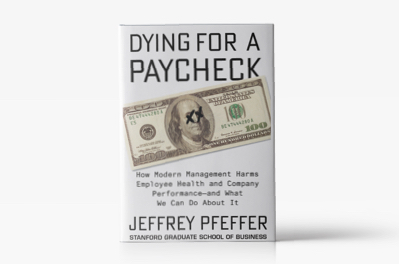Long hours. High stress. Addiction. Work-family conflict. In Jeff Pfeffer’s new book, “Dying for a Paycheck,” the Stanford Graduate School of Business Professor examines how modern management has put the physical and psychological well-being of employees at risk.
The 21st century has brought major shifts to how our workforces are structured, distributed, and managed. When people think of a modern work environment, they might reference the many perks made popular in recent years by upstart companies—things like free on-site dining, flexible vacation schedules, open floor plans, unique wellness programs, and more. These types of amenities have certainly made a positive impact on some work cultures, but they don’t tell the whole story.
Job stress costs US employers more than $300 billion annually and may cause 120,000 excess deaths each year.
The workplace, where we spend more than ⅓ of our time, plays a huge role in shaping our well-being. Unfortunately, there is mounting evidence to suggest that modern management has put the physical and psychological well-being of employees at risk, and that our work populations are no healthier now than they were decades ago—despite all of these new ‘benefits’. This is the theme of a new book by Jeff Pfeffer called, “Dying for a Paycheck.” Pfeffer, a renowned professor of organizational behavior at Stanford Graduate School of Business, examines the state of modern management and argues that human sustainability should be as important as environmental stewardship. In his book, you’ll find some eye-popping statistics looking at the economic and human toll of unhealthy workplaces.
Workforce health is a very important topic to us at Collective Health. Our company was created to empower employers to help their employees navigate the complicated healthcare system, and to ultimately drive better health outcomes. We’re fortunate to work with many companies who care deeply about the health of their employees, but we recognize that there is work to be done. What more can all of us—employers, employees, government— be doing to secure a healthier future for the people moving our economy forward?



